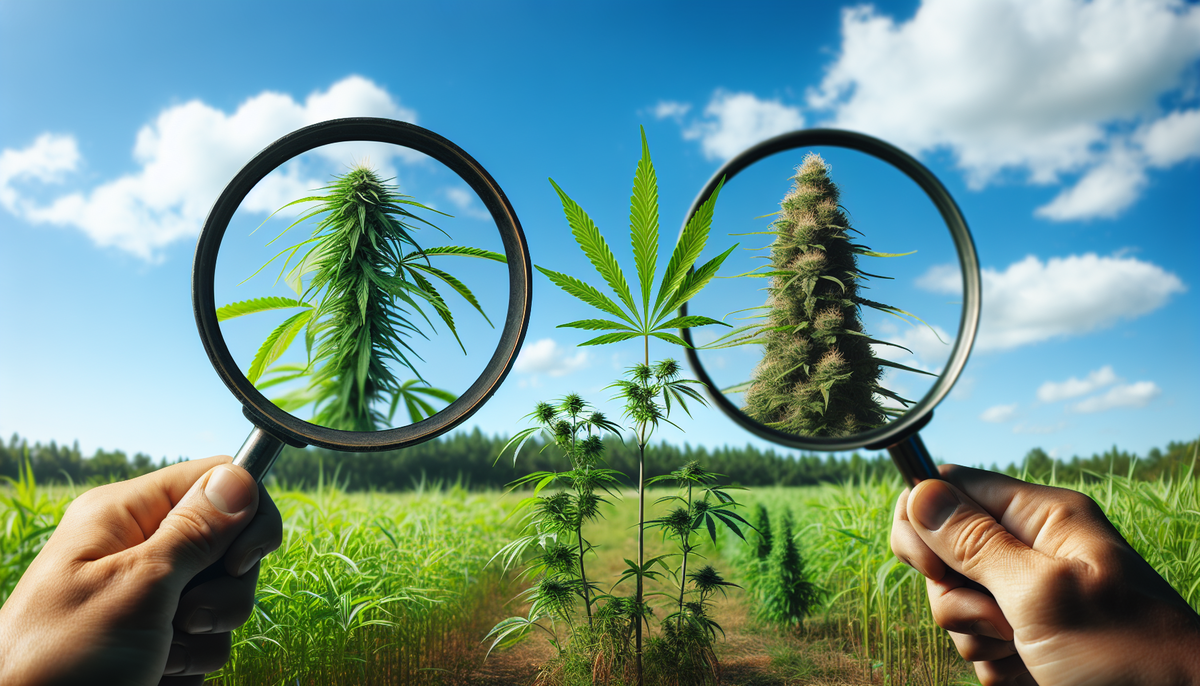What Is the Difference Between CBD Oil and Hemp Oil?
Written by: Daniel Fayad, Subject Matter Expert and Website President
Published: March 15, 2024; Last updated: April 6, 2024
- 1. Key Takeaways
- 2. Understanding the Source: Hemp vs. Cannabis Sativa Plants
- 3. The Extraction Chronicles: Cold-Pressed vs. Carbon Dioxide Methods
- 4. Composition and Cannabinoids: What’s in Your Oil?
- 5. Nutritional Profile vs. Therapeutic Potential
- 6. Industrial Hemp Products vs. CBD Wellness Goods
- 7. Legal Landscape and Labeling: Navigating the Market
- 8. Misconceptions and Marketing: Clearing the Confusion
- 9. Summary
- 10. Frequently Asked Questions
- 10.1 Do hemp and CBD have the same effects?
- 10.2 Can hemp oil have side effects?
- 10.3 What are the benefits of CBD oil?
- 10.4 Is CBD oil more expensive than hemp oil?
- 10.5 What’s the main difference between hemp seed oil and CBD oil?
- 11. References
The critical difference between CBD oil and hemp oil lies in their derivation and benefits – what is the difference between CBD oil and hemp oil? CBD oil is extracted from the plant’s flowers, leaves, and stems and is utilized for therapeutic purposes, while hemp oil comes from the seeds and is valued for nutrition. This guide provides a straightforward comparison, clarifying any confusion without the fluff.
Key Takeaways
Hemp oil is derived from the hemp plant’s seeds and is rich in nutrients like omega fatty acids. In contrast, CBD oil is extracted primarily from the stalks, leaves, and flowers of the Cannabis sativa plant and contains cannabinoids like CBD.
The cold-press method extracts hemp oil, maintaining its nutritional integrity. In contrast, CBD oil is often extracted using carbon dioxide, preserving various cannabinoids for therapeutic effects.
Regulations and labeling practices for hemp oil and CBD oil vary, with the 2018 Farm Bill legalizing CBD oil derived from hemp with less than 0.3% THC, while CBD from high-THC cannabis plants remains a controlled substance.
Understanding the Source: Hemp vs. Cannabis Sativa Plants

A common point of confusion in the hemp oil vs CBD oil debate is their origin. Both oils come from the Cannabis plant family but are extracted from different varieties. Hemp oil is derived from the seeds of the hemp plant, a type of Cannabis sativa with minimal THC content, usually below 0.3%. On the other hand, CBD oil is derived from the same plant family. Still, it contains a higher concentration of CBD and a significantly lower amount of THC compared to marijuana hybrids. So, while they originate from the same plant family, the psychoactive effects, or lack thereof, depend on whether the oil is derived from hemp or marijuana.
The cannabis plant offers a myriad of health benefits, but the benefits you derive depend on whether you choose hemp or CBD oil. Thus, comprehending the source of your oil is vital as it profoundly impacts its attributes and outcomes.
The Extraction Chronicles: Cold-Pressed vs. Carbon Dioxide Methods
The extraction method utilized also significantly contributes to differentiating between these oils. Hemp seed oil is extracted through the cold-pressing process from the cannabis plant’s seeds. This process is similar to how olive oil and sunflower oil are derived, maintaining the integrity of the fatty acids and preserving the oil’s nutritional benefits. ²
On the other hand, CBD oil is extracted using carbon dioxide or other methods, often from the leaves, stems, and flowers of the hemp plant. This extraction process allows for preserving a wide range of cannabinoids, giving CBD oil its unique therapeutic potential. ¹
The extraction process is essential in determining hemp and CBD oil’s composition, quality, and benefits. Thus, gaining insight into the extraction process is integral when choosing between these oils.
Composition and Cannabinoids: What’s in Your Oil?

Delving into the composition of these oils, we find another stark difference. Hemp seed oil is rich in:
Omega-3 and omega-6 fatty acids
B vitamins
Vitamin D
Different nutritional antioxidants
These nutrients are beneficial for overall health and well-being. However, it doesn’t contain cannabinoids like CBD or THC since it’s derived from pressed hemp seeds.
In contrast, CBD oil contains:
Cannabidiol (CBD) and other cannabinoids that interact with the body’s endocannabinoid system (ECS)
The ECS plays a crucial role in maintaining the body’s natural balance.
It regulates vital physiological functions such as mood, temperature, cognitive processes, and tissue repair.
Different formulations of CBD oil, such as broad-spectrum, full-spectrum, or CBD isolate, can enhance their effectiveness through a phenomenon known as the ‘entourage effect.’
Therefore, when deciding between hemp seed oil and CBD oil, knowing their composition is essential. The components of these oils significantly affect their potential benefits and uses. ³
Nutritional Profile vs. Therapeutic Potential

Hemp seed oil and CBD oil, both types of hemp oils, also differ significantly in their nutritional profiles and therapeutic potential. Hemp seed oil, rich in essential fatty acids, is a dietary supplement and offers various nutritional benefits. It enhances skin health, promotes cardiovascular health, and potentially alleviates specific PMS symptoms. It’s often used in culinary arts, which boosts dishes and salad dressings.
On the other hand, CBD oil exhibits therapeutic potential for a range of conditions, such as anxiety, depression, pain, and inflammation. It also can enhance mood, facilitate workout recovery, and even assist pets with their well-being and mobility.
Understanding hemp seed oil’s nutritional profile and CBD oil’s therapeutic potential enables consumers to make knowledgeable decisions tailored to their needs and preferences.
Industrial Hemp Products vs. CBD Wellness Goods

While hemp seed oil and CBD oil both come from the cannabis plant, their applications are quite diverse. Both hemp seed oil and CBD oil are used in various products and industries. Hemp seed oil is used in:
Dietary supplements like salad dressings and milk substitutes
Industrial products such as lubricants, paints, and plastics
Coatings like paints and varnishes
Manufacture of plastic flooring materials like linoleum
Conversely, CBD oil is primarily featured in wellness products. It’s found in:
Topical pain-relieving creams
Edible forms like tinctures and gummies
Beverages
Beauty products
Various CBD oils
The extensive array of applications demonstrates the adaptability of these oils, underscoring their utility across various sectors, encompassing wellness, beauty, and industrial goods.
Legal Landscape and Labeling: Navigating the Market

Navigating the market for hemp oil and CBD oil can be challenging due to varying regulations and labeling practices. CBD oil derived from hemp plants with a THC content of less than 0.3% is considered legal under the 2018 Farm Bill. However, CBD derived from cannabis plants with high THC levels is still categorized as a controlled substance.
The terms’ hemp oil’ and ‘CBD oil’ are occasionally interchanged on product labels, particularly in settings where there may be doubt or suspicion surrounding CBD products. This mislabeling can confuse and lead consumers to purchase products that may be different from what they initially intended to buy.
Consumers can examine the ingredients list to differentiate between products containing CBD oil and those with hemp seed oil. CBD oil will be specified as cannabidiol, broad-spectrum hemp, full-spectrum hemp, or hemp extracts. In contrast, hemp seed oil will generally be indicated as Cannabis sativa seed oil without reference to extracts.
Transparency is highly valued in this industry as it builds consumer trust in the products they purchase, ensuring they understand the product contents comprehensively.
Misconceptions and Marketing: Clearing the Confusion
Unfortunately, the potential for mislabeling and misconceptions in the industry is high, and some manufacturers may capitalize on the cost difference and popularity of the oils. Manufacturers of hemp and CBD oil products may mislabel their products by:
inaccurately declaring the quantity of CBD in the product
misrepresenting the cannabinoid content
falsely asserting that the product is THC-free when it contains THC.
Furthermore, CBD oil carries a higher price tag compared to hemp seed oil. This price disparity can lead manufacturers to misrepresent their products to capitalize on the trend.
The surge in popularity of CBD oil has significantly influenced the expansion of the hemp seed oil market as well. The growing recognition and diverse medicinal applications of CBD products have played a role in the increased demand for hemp seed oil.
Summary
In conclusion, while hemp seed oil and CBD oil both come from the Cannabis plant family, they are distinctly different in their extraction methods, composition, nutritional profile, therapeutic potential, and applications. The differences between these oils are significant, and understanding their unique characteristics can help consumers make informed decisions based on their specific needs and preferences.
Whether looking for a dietary supplement rich in essential fatty acids, vitamins, and antioxidants or a therapeutic oil that interacts with the body’s endocannabinoid system, the choice between hemp seed oil and CBD oil is now more precise. Empowered with understanding, you can navigate the market confidently and choose the right oil for your needs.
Frequently Asked Questions
Do hemp and CBD have the same effects?
Yes, hemp and CBD have the same effects because the benefits of CBD do not change whether it is marijuana-derived CBD or hemp-derived CBD, and they both have common side effects such as drowsiness, diarrhea, and changes in appetite. Therefore, the effects are similar.
Can hemp oil have side effects?
Yes, hemp oil can have side effects such as severe allergic reactions, sleepiness, bloodshot eyes, and liver problems in rare cases. It’s important to use hemp products with caution if you have allergies or are undergoing surgery.
What are the benefits of CBD oil?
CBD oil possesses many health benefits, such as relieving pain, anxiety, depression, and sleep disorders. However, it’s important to note that there is limited clinical data on the best dose or forms of CBD, and its over-the-counter products are not well-regulated.
Is CBD oil more expensive than hemp oil?
Yes, hemp oil is generally less expensive than CBD oil, with hemp oil costing about $15 per bottle on average, making it a more cost-effective option. Check the ingredients list to ensure you’re purchasing the right product.
What’s the main difference between hemp seed oil and CBD oil?
The main difference between hemp seed oil and CBD oil is that hemp seed oil does not contain cannabinoids like CBD or THC, while CBD oil does contain CBD and other cannabinoids. Therefore, hemp seed oil is rich in essential fatty acids, vitamins, and antioxidants but does not interact with the body’s endocannabinoid system.
References
VanDolah, H. J., Bauer, B. A., & Mauck, K. F. (2019). Clinicians’ Guide to Cannabidiol and Hemp Oils. Mayo Clinic proceedings, 94(9), 1840–1851. https://doi.org/10.1016/j.mayocp.2019.01.003
Pavlovic, R., Nenna, G., Calvi, L., Panseri, S., Borgonovo, G., Giupponi, L., Cannazza, G., & Giorgi, A. (2018). Quality Traits of “Cannabidiol Oils”: Cannabinoids Content, Terpene Fingerprint and Oxidation Stability of European Commercially Available Preparations. Molecules (Basel, Switzerland), 23(5), 1230. https://doi.org/10.3390/molecules23051230
Cerino, P., Buonerba, C., Cannazza, G., D’Auria, J., Ottoni, E., Fulgione, A., Di Stasio, A., Pierri, B., & Gallo, A. (2021). A Review of Hemp as Food and Nutritional Supplement. Cannabis and cannabinoid research, 6(1), 19–27. https://doi.org/10.1089/can.2020.0001

Written by Daniel Fayad - Subject Matter Expert and Website President
Dan Fayad is a results-driven healthcare administration expert and content writer. With a Master of Health Administration from the University of Southern California, he’s carved a niche for himself in the dynamic world of healthcare and business development. Dan uses his experience to educate and empower people on their wellness journeys.
Join the CBDeals Club!
Get 10% off your first order and receive our best and exclusive promotions directly to your inbox!

